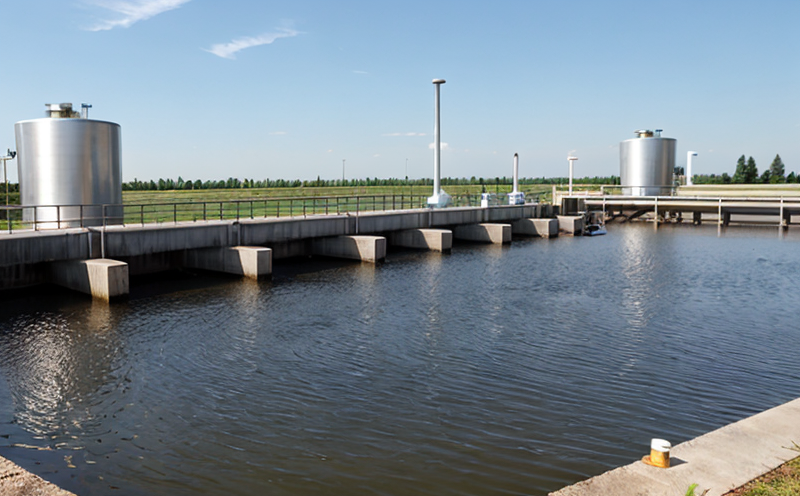ASTM E2720 Biofilm-Forming Bacteria Detection in Water Systems
The ASTM E2720 standard provides a method to detect biofilm-forming bacteria (BFB) in water systems, which is critical for ensuring the safety and quality of drinking water. Biofilms can harbor pathogenic microorganisms that may not be detected by traditional water quality tests, thus posing significant health risks if present in potable water supplies.
Water systems are particularly vulnerable to biofilm formation due to their complex plumbing networks and varying flow rates. Bacteria like Pseudomonas aeruginosa, Legionella pneumophila, and Mycobacterium avium can colonize these surfaces, forming a protective matrix that makes them more resilient to conventional disinfection methods.
The ASTM E2720 procedure involves the inoculation of water samples with a defined bacterial suspension followed by incubation under controlled conditions. Afterward, the biofilm is stained and visualized using microscopy techniques. This method allows for the differentiation between true biofilms and non-biofilm structures such as sediment or organic debris.
The detection of biofilm-forming bacteria helps in identifying potential sources of contamination within water systems. It provides valuable insights into the effectiveness of existing disinfection protocols and highlights areas where improvements are needed to maintain water quality standards. Compliance with this standard ensures that facilities operate under stringent regulatory requirements set forth by authorities like the United States Environmental Protection Agency (EPA).
Our laboratory utilizes state-of-the-art equipment and follows strict adherence to ASTM E2720 guidelines to ensure accurate results. By providing reliable biofilm detection services, we contribute significantly towards safeguarding public health.
- ISO 14001: Environmental Management System
- ASTM E2720-19: Standard Practice for Detecting Biofilm-Forming Bacteria in Water Systems
- EN ISO 9001: Quality Management System
Quality and Reliability Assurance
At our facility, we maintain rigorous quality control measures to ensure the accuracy and reliability of all testing processes. Our team adheres strictly to international standards such as ISO 17025 for laboratory accreditation, ensuring that every test conducted meets global benchmarks.
We employ certified analysts who are trained specifically in performing ASTM E2720 biofilm-forming bacteria detection tests. These experts utilize advanced optical microscopes equipped with fluorescence capabilities to identify and quantify biofilms effectively. Their expertise guarantees consistent and precise results across multiple samples.
In addition, our laboratory participates actively in proficiency testing programs organized by recognized bodies like the American Society for Testing and Materials (ASTM). This ongoing assessment ensures continuous improvement in analytical techniques and maintains high levels of performance consistently over time.
Our commitment to quality is further underscored through regular internal audits conducted by independent third parties. These evaluations focus on procedural adherence, personnel competency, equipment calibration, and data accuracy among other factors. Through these stringent measures, we strive to deliver unparalleled service excellence in detecting biofilm-forming bacteria within water systems.
International Acceptance and Recognition
The ASTM E2720 standard enjoys widespread international acceptance due to its comprehensive approach towards identifying biofilm-forming bacteria in water systems. Many countries have incorporated this practice into their national regulations, recognizing the importance of preventing biofilm-related issues.
- Australia: The Australian Drinking Water Guidelines recommend using methods similar to ASTM E2720 for monitoring biofilms in drinking water distribution systems.
- Canada: Health Canada guidelines suggest following ASTM E2720 procedures when assessing biofilm levels in municipal water supplies.
- European Union: Directive 2008/105/EC on the quality of water intended for human consumption requires member states to implement measures that prevent or reduce the formation of biofilms, including those specified in ASTM E2720.
- New Zealand: The New Zealand Drinking Water Standards specify ASTM E2720 as a recommended method for detecting biofilm-forming bacteria in treated waters.
By adhering to this widely accepted standard, our laboratory ensures compliance with international best practices and contributes positively towards maintaining safe drinking water standards globally.
Environmental and Sustainability Contributions
Detecting biofilm-forming bacteria plays a crucial role in environmental protection and sustainability efforts. Preventing the growth of harmful microorganisms within water systems not only enhances public health but also promotes sustainable resource management practices.
The prevention of biofilm formation helps reduce energy consumption associated with continuous disinfection processes, thereby lowering operational costs for utilities. Moreover, it minimizes chemical usage, reducing environmental pollution from excess biocides.
By identifying and addressing potential sources of contamination early on, we assist clients in implementing preventive maintenance strategies that extend the lifespan of water infrastructure assets while minimizing disruption during repairs or replacements.
In summary, our biofilm-forming bacteria detection service supports broader goals related to environmental conservation and sustainable development by promoting efficient use of resources and reducing adverse impacts on ecosystems.





